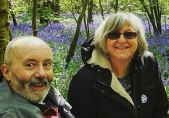Alison 63, who cares for her husband Chas, also 63, from West Sussex.
‘We have had excellent help from social services’
 My first encounter with CADASIL was when my husband Chas was diagnosed at the age of 46. His initial symptom was temporary loss of coherent speech. As time progressed he began to lose some cognitive skills and difficulty making decisions.
My first encounter with CADASIL was when my husband Chas was diagnosed at the age of 46. His initial symptom was temporary loss of coherent speech. As time progressed he began to lose some cognitive skills and difficulty making decisions.
The first thing he did after diagnosis and some research, was to write to his brother and sister to explain the genetic implications. We of course were concerned about our children as there was a 50 per cent chance of inheriting the condition. My mother-in-law was always in denial that her minor strokes from the age of 75 were a result of CADASIL. She died age 86.
Chas used to work as a college lecturer, but was eventually asked to leave due to cognitive problems. He did carry on with some voluntary work, but his fellow volunteers had to make adjustments due to his condition.
He is now completely dependent on me and others for his care. He is unable to walk, feed or wash himself and is incontinent. He does not seem to be in any pain and although is unable to hold a conversation, appears to like being around people and shows emotions such as laughing and crying (usually at the TV news).
Our second son was unfortunately diagnosed with CADASIL at the age of 23. Initially he suffered severe migraines, loss of movement in his limbs and difficulty with speech and swallowing. Now at the age of 36 is in constant pain in his head and joints and suffers several seizures a week. He is married with a daughter of 18 months who tested negative for CADASIL by amniocentesis.
We also have a son of 38 who has a son of 5, and a daughter of 35, who has a son of 4. They as yet have decided not to be tested.
We have found that most medical practitioners are not knowledgeable of CADASIL, and although have attempted to treat symptoms as they arise, can of course not offer long term answers.
We have had excellent help from social services, especially from occupational health with mobility equipment. My husband receives PIP and ESA and I claim carers allowance.
In 2014, my husband and I moved back to the south from the Lake District to be nearer our family. Although living with CADASIL is difficult for us all, it has probably brought us closer as a family. We just help each other though the problems.
My hope for the future is of course the hope that no more members of my family are affected by CADASIL. Also that research progresses quickly with genetic engineering so that this condition can be halted.



